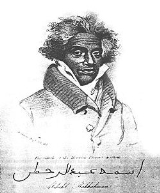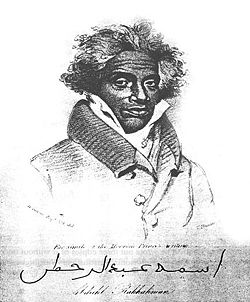
Abdulrahman Ibrahim Ibn Sori
Encyclopedia

Slavery
Slavery is a system under which people are treated as property to be bought and sold, and are forced to work. Slaves can be held against their will from the time of their capture, purchase or birth, and deprived of the right to leave, to refuse to work, or to demand compensation...
in the United States. In 1828, he was freed after spending 40 years in slavery by the order of President John Quincy Adams
John Quincy Adams
John Quincy Adams was the sixth President of the United States . He served as an American diplomat, Senator, and Congressional representative. He was a member of the Federalist, Democratic-Republican, National Republican, and later Anti-Masonic and Whig parties. Adams was the son of former...
and Secretary of State Henry Clay
Henry Clay
Henry Clay, Sr. , was a lawyer, politician and skilled orator who represented Kentucky separately in both the Senate and in the House of Representatives...
after the Sultan of Morocco requested his release.
Life
He was born in 1762 in TimboTimbo
Timbo is a town and sub-prefecture in the Mamou Prefecture in the Mamou Region of Guinea.It is located in the Fouta Djallon highlands of Guinea, lying north east of Mamou, in a part of the country mostly occupied by the Fula people. It was formerly an important religious centre and is still...
, West Africa
West Africa
West Africa or Western Africa is the westernmost region of the African continent. Geopolitically, the UN definition of Western Africa includes the following 16 countries and an area of approximately 5 million square km:-Flags of West Africa:...
, (in present day Guinea, Fouta Djallon
Fouta Djallon
Fouta Djallon is a highland region in the centre of Guinea, West Africa. The indigenous name is Fuuta-Jaloo...
). He was known as the "Prince of Slaves" or "Prince." He was a Fulbe or Fulani, (Fula
Fula people
Fula people or Fulani or Fulbe are an ethnic group spread over many countries, predominantly in West Africa, but found also in Central Africa and Sudanese North Africa...
) of the land of Fouta Djallon. Ibrahim left Futa in 1774 to study in Mali
Mali
Mali , officially the Republic of Mali , is a landlocked country in Western Africa. Mali borders Algeria on the north, Niger on the east, Burkina Faso and the Côte d'Ivoire on the south, Guinea on the south-west, and Senegal and Mauritania on the west. Its size is just over 1,240,000 km² with...
at Timbuktu. Ibrahim was leader of one of his father's army divisions. After winning a battle against a warring nation, he took with him a few soldiers to report back to his father, when he was ambushed, captured, and sold to slave traders in 1788 at the age of 26. He was bought by a Natchez, Mississippi
Natchez, Mississippi
Natchez is the county seat of Adams County, Mississippi, United States. With a total population of 18,464 , it is the largest community and the only incorporated municipality within Adams County...
cotton plantation owner, and eventually became the overseer
Overseer
Rob Overseer is an English DJ/producer, born in Leeds whose works have been included in soundtracks for Animatrix, Snatch, Any Given Sunday and The Girl Next Door, as well as video games like Need for Speed: Underground, NFL Gameday 2004, several Matchstick Productions ski films, and Stuntman,...
of the plantation of Thomas Foster. In 1794 he married Isabella, another slave of Foster’s, and eventually fathered a large family: five sons and four daughters.
By using his knowledge of growing cotton in Fouta Djallon, Abd al-Rahman Ibrahim rose to a position of authority on the plantation and became the de facto
De facto
De facto is a Latin expression that means "concerning fact." In law, it often means "in practice but not necessarily ordained by law" or "in practice or actuality, but not officially established." It is commonly used in contrast to de jure when referring to matters of law, governance, or...
foreman. This granted him the opportunity to grow his own vegetable garden and sell at the local market. During this time, he met an old acquaintance, Dr. John Cox. Dr. Cox was an Irish surgeon who had served on an English ship. He was the first white man to reach Timbo after being stranded by his ship and falling ill. Cox stayed ashore for six months and was taken in by the Abd al-Rahman Ibrahima family. Cox appealed to Foster to sell him "Prince" so he could return to Africa. However, Foster would not budge, since he viewed Abd al-Rahman Ibrahim as indispensable to the Foster farm (among other reasons). Dr. Cox continued, until his death in 1816, to seek Ibrahim's freedom, to no avail. After Cox died, Ibrahim continued the cause.
In 1826, Abd al-Rahman Ibrahim wrote a letter to his relatives in Africa. A local newspaperman, Andrew Marschalk
Andrew Marschalk
Andrew Marschalk was a New York-born printer, best known for championing the case of Ab-dul Rahman Ibrahima Ibn Sori, popularly known as the "Prince of Slaves"....
, who was originally from New York, sent a copy to Senator Thomas Reed
Thomas Reed
Thomas Reed may refer to:*Thomas W. Reed II, current United States Representative for the state of New York*Thomas Brackett Reed , Speaker of the United States House of Representatives from Maine...
in Washington
Washington, D.C.
Washington, D.C., formally the District of Columbia and commonly referred to as Washington, "the District", or simply D.C., is the capital of the United States. On July 16, 1790, the United States Congress approved the creation of a permanent national capital as permitted by the U.S. Constitution....
, who forwarded it to the U.S. Consulate in Morocco
Morocco
Morocco , officially the Kingdom of Morocco , is a country located in North Africa. It has a population of more than 32 million and an area of 710,850 km², and also primarily administers the disputed region of the Western Sahara...
. Since Abdal-Rhaman Ibrahim wrote in Arabic, Marschalk and the U.S. government assumed that he was a Moor
Moors
The description Moors has referred to several historic and modern populations of the Maghreb region who are predominately of Berber and Arab descent. They came to conquer and rule the Iberian Peninsula for nearly 800 years. At that time they were Muslim, although earlier the people had followed...
. After the Sultan of Morocco Abderrahmane
Abderrahmane of Morocco
Moulay Sharif Abderrahmane was sultan of Morocco from 1822 to 1859. He was a member of the Alaouite dynasty.-Biography:He was born in 1778. His reign began at the start of the French occupation of Algeria...
read the letter, he asked President Adams and Secretary of State Henry Clay to release Abd al-Rahman Ibrahim. In 1828, Thomas Foster agreed to the release of Ibrahim, without payment, with the stipulation that Ibrahim return to Africa and not live as a free man in America.
Before leaving the U.S., Ibrahim and his wife went to various states and Washington, D.C. He solicited donations, through the press, personal appearances, the American Colonization Society
American Colonization Society
The American Colonization Society , founded in 1816, was the primary vehicle to support the "return" of free African Americans to what was considered greater freedom in Africa. It helped to found the colony of Liberia in 1821–22 as a place for freedmen...
and politicians, to free his family back in Mississippi. Word got back to Foster, who considered this a breach of the agreement. Abdul-Rahman's actions and freedom were also used against President John Quincy Adams by future president Andrew Jackson
Andrew Jackson
Andrew Jackson was the seventh President of the United States . Based in frontier Tennessee, Jackson was a politician and army general who defeated the Creek Indians at the Battle of Horseshoe Bend , and the British at the Battle of New Orleans...
during the presidential election.
After ten months, Abd al-Rahman Ibrahim and Isabella had raised only half the funds to free their children. They made arrangements to leave America. He went to Monrovia, Liberia with his wife. Abd al-Rahman Ibrahim lived for four months before he contracted a fever and died at the age of 67. He never saw Fouta Djallon or his children again.
Legacy
The funds that Abdul-Rahman and Isabella raised bought the freedom of two sons and their families. They were reunited with Isabella in Monrovia. Thomas Foster died the same year as Abdul-Rahman. Foster's estate, including Abdul-Rahman's other children and grandchildren, was divided among Foster's heirs and scattered across Mississippi and the South. Abdul-Rahman's descendants still reside in Monrovia and the United StatesUnited States
The United States of America is a federal constitutional republic comprising fifty states and a federal district...
. In 2006, Abdul-Rahman's descendants gathered for a family reunion at Foster's Field.
He wrote two autobiographies. A drawing of him is displayed in the Library of Congress
Library of Congress
The Library of Congress is the research library of the United States Congress, de facto national library of the United States, and the oldest federal cultural institution in the United States. Located in three buildings in Washington, D.C., it is the largest library in the world by shelf space and...
.
In 1977, history professor Terry Alford documented the life of Ibn Sori in Prince Among Slaves, the first full account of his life, pieced together from first-person accounts and historical documents. In Prince Among Slaves, Alford writes:
Among Henry Clay's documents, for the year 1829 we find the January 1 entry, "Prince Ibrahima, an Islamic prince sold into slavery 40 years ago, and freed with the stipulation that he return (in this case the word "return" makes sense) to Africa, joined the black citizens of Philadelphia as an honored guest in their New Year's Day parade, up Lombard and Walnut, and down Chestnut and Spruce streets.
Early in 2008 PBS
Public Broadcasting Service
The Public Broadcasting Service is an American non-profit public broadcasting television network with 354 member TV stations in the United States which hold collective ownership. Its headquarters is in Arlington, Virginia....
showed a Spark Media Incorporated and Unity Productions Foundation film directed by Andrea Kalin titled Prince Among Slaves, portraying the life of Abdul Rahman. The film had premiered in Cincinnati, Ohio
Cincinnati, Ohio
Cincinnati is a city in the U.S. state of Ohio. Cincinnati is the county seat of Hamilton County. Settled in 1788, the city is located to north of the Ohio River at the Ohio-Kentucky border, near Indiana. The population within city limits is 296,943 according to the 2010 census, making it Ohio's...
, on 2007 June.
See also
- Prince Among Slaves (film)Prince Among Slaves (film)Prince Among Slaves is a historical documentary directed, written and produced by Andrea Kalin and narrated by Mos Def made for PBS by Unity Productions Foundation...
- Islam in the United StatesIslam in the United StatesFrom the 1880s to 1914, several thousand Muslims immigrated to the United States from the Ottoman Empire, and from parts of South Asia; they did not form distinctive settlements, and probably most assimilated into the wider society....
- Slavery in the United States
External links
- http://www.upf.tv/upf06/Films/PrinceAmongSlaves/Geanealogy/tabid/305/Default.aspx
- Prince Among Slaves Official Movie Site
- Trailer to the Unity Productions Foundation PBS documentary Prince Among Slaves that chronicles the life of Ibrahim_Abd_ar-Rahman
- MuslimWiki Ibrahim Abd ar-Rahman
- IMDb Prince Among Slaves (2006)
- Prince Among Slaves | PBS
- Film Challenges Convention on Muslims, Africans, Slave-Era America

